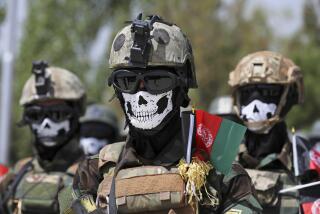Race for the Exits
- Share via
The Soviet Union is accelerating the withdrawal of the last 20,000 troops that it still has in Afghanistan, raising the possibility that its pullout could be completed before the deadline set for Feb. 15. The Russians, though, aren’t the only foreigners running for the exits. The United States, the major Western European countries and Japan have told their diplomats and other nationals to go, and quickly. Afghan officials profess to see in these departures a plot to destabilize the Communist regime that will be left to fend for itself after the last Soviet soldier has gone home. It is not sinister political design that motivates this exodus, however, but the well-founded fear that anarchy and civil war are about to descend on the country, leaving everyone--Afghan or foreigner--exposed and at risk.
The rebellion mounted by the Afghans against Soviet occupation eight years ago and now apparently about to be turned in full fury against the Soviet-backed regime in Kabul is unlike any in recent memory. It is a rebellion without a unifying and centralized leadership, lacking in common goals (except a virulent opposition to Marxism), torn by competing personal ambitions and bitter tribal feuds. There are a half-dozen major resistance groups operating out of Pakistan, where several million Afghans live as refugees. There are other, lesser-known armed units that draw their support from Iran, where hundreds of thousands of Afghans have also found haven. Still other bands that are little more than criminal gangs are believed ready to emerge from mountain valleys and urban alleyways to seize their part of the spoils.
An Afghan historian was asked the other day why Soviet forces so clearly on their way out of the country continue to be attacked, inviting terrible retribution in return. Ours, he said simply, is a culture of vengeance. That driving compulsion to settle scores and satisfy honor may be as old as the habitation of Afghanistan itself. Darius the Great and his Persian conquerors probably felt it 2,500 years ago; a lot of Afghans, and not just those who cooperated with the Soviets, probably are about to feel it now. If the great political fear in Lebanon is that irreconcilable religious animosities have led to the de facto cantonization of the country, the great political fear in Afghanistan must be that what is about to happen there could make Lebanon look like a picnic.
In these conditions it is only prudent for foreigners to get out of the way, at least until clear signs emerge that some degree of order and security exists. Millions of Afghans, unhappily, do not have that same chance.
More to Read
Sign up for Essential California
The most important California stories and recommendations in your inbox every morning.
You may occasionally receive promotional content from the Los Angeles Times.













